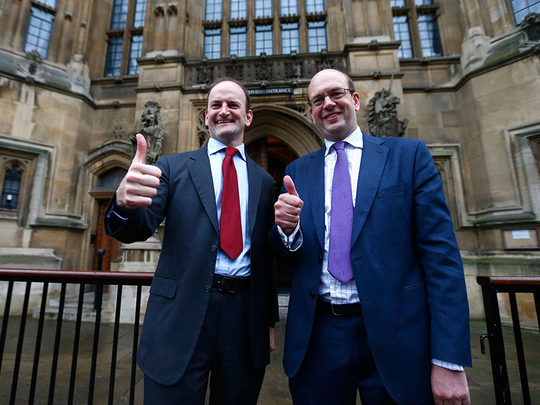
Dubai: The United Kingdom Independence Party (Ukip) will target at least 20 seats it believes it can win at next May’s general election in an attempt to hold the balance of power in another hung parliament at Westminster.
Nigel Farage raised his party’s sights after Mark Reckless, the second Tory MP to defect to Ukip, held his Rochester and Strood seat in Thursday’s by-election with a majority of 2,920 over his old party.
Both Prime Minister and Conservative Party Leader David Cameron and Ed Miliband, the Labour Party leader and Leader of the Opposition, came under pressure from their own parties to change their strategy to combat the growing threat from Ukip.
Labour was engulfed by accusations of losing touch with its working-class voters after MP Emily Thornberry tweeted a picture of a house covered in England flags, but the Conservatives were also left soul-searching, having been confident at one stage of winning the seat.
“This result will increase the likelihood of [more Tory MP] defections and Ukip increasing its number of target seats,” said Matthew Goodwin, associate professor of politics at Nottingham University, who is writing a book on Ukip’s election strategy. “We are realistically looking at something like a 20-seat target campaign,” he added.
He said Ukip had learnt how to target its resources to maximise its chances under the first-past-the-post system. However, he believed Ukip may win only five to seven seats — even on a “good day”.
Speaking in Rochester after the by-election win, a jubilant Farage said: “We’ve made a few decision on which seats to target already. Can we do this in a few dozen seats? I think we can, yes.”
The Ukip leader conceded that he no longer expected any more Tory MPs to defect before Christmas. “I’d love it. But I don’t think people will defect immediately. I think they will sit and chew their teeth and have a think about things. I think defections are more likely after Christmas,” he said.
Ukip is carrying out polling in Tory-held constituencies in the hope of persuading the sitting MPs they would have a better chance of winning if they jumped ship.
Farage revealed that Ukip plans to approach Tory MPs in Labour-Tory marginal seats outside London who were vulnerable at the election.
“The Conservative Party is dying, literally dying in the urban North in the way it has in Scotland. [There is] a list of five Tory MPs who’ve got no chance of winning on a blue rosette but who might have a chance on a purple rosette, so let’s see what happens.”
The Tories put a brave face on their defeat, arguing that the winning margin was less than Ukip had hoped for.
Cameron insisted: “I am absolutely determined to win this seat back at the next general election because anything other than a Conservative government will put our recovery at risk and Ed Miliband in Downing Street.”
Privately, some Tory MPs admitted the defeat was a setback after their party threw the “kitchen sink” at the contest and Cameron made an unprecedented five campaign visits.
-- Compiled from agencies












